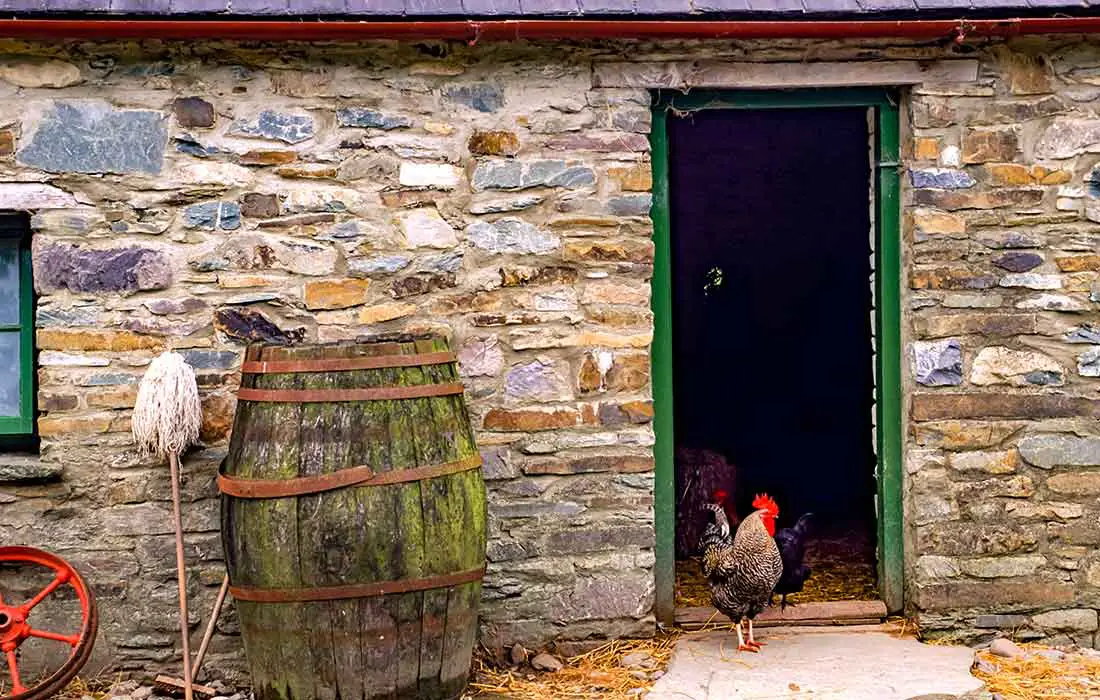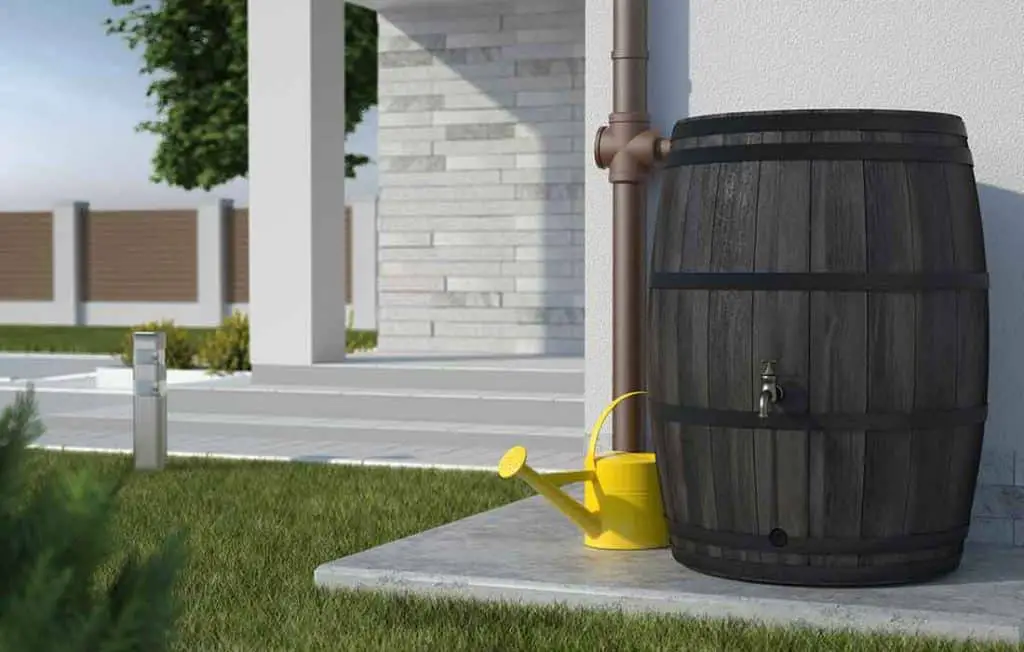Lugging water across your yard to the chicken coop is always a struggle. As a chicken keeper, you’re always on the lookout for easier ways to keep your chickens happy and healthy. So, what about rain barrel water? Is it safe for chickens and other animals to drink?
Can Chickens Drink Rain Barrel Water
Yes, chickens can drink rain barrel water. It is completely safe for your chickens to drink and the easiest and cheapest way to provide water for them. Once the system is built, it will keep your chickens hydrated without you having to do a lot of work.
We’ll take a whether or not it’s safe, how to keep the water clean, and how to build your rain barrel system for your chicken coop.

*This page contains affiliate links to products I recommend. If you purchase something from this page, I may receive a small percentage of the sale at no extra cost to you.
Is Rain Water Safe For Chickens
Murano Chicken Farm has been giving their chickens rainwater for about eight years. They claim that rainwater is not only easy to collect, but it’s also good for your chickens!
Rainwater is perfectly safe for your chickens to consume, but ONLY if it has been collected and maintained correctly. It is safer than tap water, as some tap water still contains trace contaminants even after it is filtered.
It’s why many people in the United States use some type of water filtration system, drink distilled or purified water.
Ensure whatever container you are collecting your water in, whether it be a rain barrel, bucket, or tub, is approved for animal feed or is aquarium safe. This means it will be safe for your chickens to drink from.
Plus, you won’t have to worry about your chickens having a hard time trying to drink from a small water bowl, especially, if you have a large flock.
Roof Contaminants
Rain water collected through roof water run-off is safe depending on the type of roof.
Water collected from metal/tin or plastic roofing is safe for your chickens and other animals to drink.
However, water collected from wood or shingles can contain harmful chemicals and preservatives that aren’t safe for your chickens.
Outside Contaminants
You should also consider the possibility of the water being contaminated after it has is collected.
This could be materials or bird droppings falling into the water. You can buy a screen mesh to put over the top of your chosen container to keep out debris, but it is still important to check the water regularly for cloudiness.
It could mean other bird droppings have gotten into the water, and the container should be dumped out and cleaned correctly.
Make sure to observe your collected water for any changes. Sniff it; if it smells funky, it has probably collected some bacteria and is no longer safe for your chickens to drink.
Regardless of the type of barrel you use, it should be scrubbed periodically to prevent biofilm buildup- a slimy layer of bacteria that sticks to the sides. If this buildup gets too thick, it can accumulate harmful bacteria such as E. Coli.
For a deep clean, you’ll want to use a mixture of vinegar, water, or a light bleach water solution to remove any algae from the barrel. Inspect the spigot of the barrel to ensure it is clean, and no debris is stuck inside.
Rain Water From Different Locations
According to Hindawi, a journal of environmental and public health, the air quality in your area can affect the number of pollutants in your rain water.
It shouldn’t be too much of a concern unless you live in a highly industrial area. It’s essential to check the air quality in your area and decide if you’re comfortable giving rain water to your chickens or not.
How To Collect Rain Water
The easiest way to collect rainwater is to place a rain barrel or tub out in the open, allowing it to fill up when it rains. This plastic rain barrel holds up to 50 gallons of water and is resistant to mold, rust, algae, and mildew growth. It’s perfect if you don’t want to spend a lot of time scrubbing and cleaning the barrel.
You can also place the barrel where water runs off your roof or chicken coop, as long as the roof is tin or plastic. This method will fill your container up faster than just placing it in the open.
There are also ways you can attach piping to your house or coop; the water will run down from the roof to the gutter, into the downspout, and into a divider, then it will feed into the rain barrel.
The overflow will go through the downspout to the ground. You’ll need to drill a hole in the top of your barrel and attach a plastic cup with an aluminum screen to filter the water.
It will keep leaves, other debris from getting into the water.
DIY Rain Barrel Chicken Waterer

Many backyard chicken owners understand the importance of keeping their chickens hydrated. When set up correctly, you can ensure your chickens will have enough fresh, clean water to drink for at least two months or more, depending on the size of the barrel you use.
A rainwater system can work wherever you live, even if you don’t get a lot of rain.
Before You Get Started
Here’s what you need to create your rain barrel system for your chickens.
- Gutter or roof flashing 1.5″ x 1.5.”
- PVC fitting and about 4 ft PVC piping
- Electrical conduit strapping (mounting to the coop)
- PVC Tee
- Steel bracket
- 50-55 gallon Rain Barrel, Reclaimed wine barrels, or something to catch the rain
You can create your rain barrel system by watching this video. It will walk you through step by step on building your system without spending a lot of money.
Whatever method you choose, make sure the barrel is close to your chicken coop, so you don’t have to lug water too far. You can collect your rain water from the barrel using a bucket or by attaching a spout at the bottom.
Conclusion
Rain barrel water is safe for your chickens to drink as long as you do it properly. They will love the easy access to fresh clean water, and you’ll love not having to drag your garden hose all over the backyard to fill up their water bowl.
Collecting your rainwater in the open or using a tin or plastic roof ensures no chemicals or preservatives can harm your chickens. Make sure to check your local air quality before deciding if rain barrel water is right for you and your flock.
Chickens can consume about 2-4 cups of water per day, and even more in the heat. You can now rest easy knowing there is a safe water source for your chickens right outside the coop.
A homemade rain barrel system makes it much easier for you to keep your chickens hydrated, but you will need to deep clean it at least once a month.
Related Articles